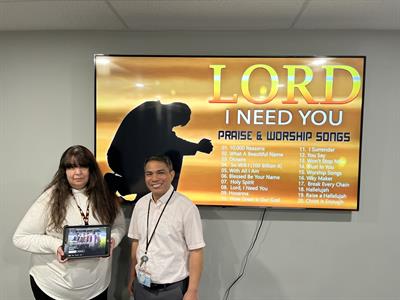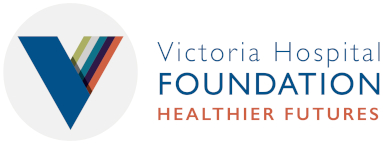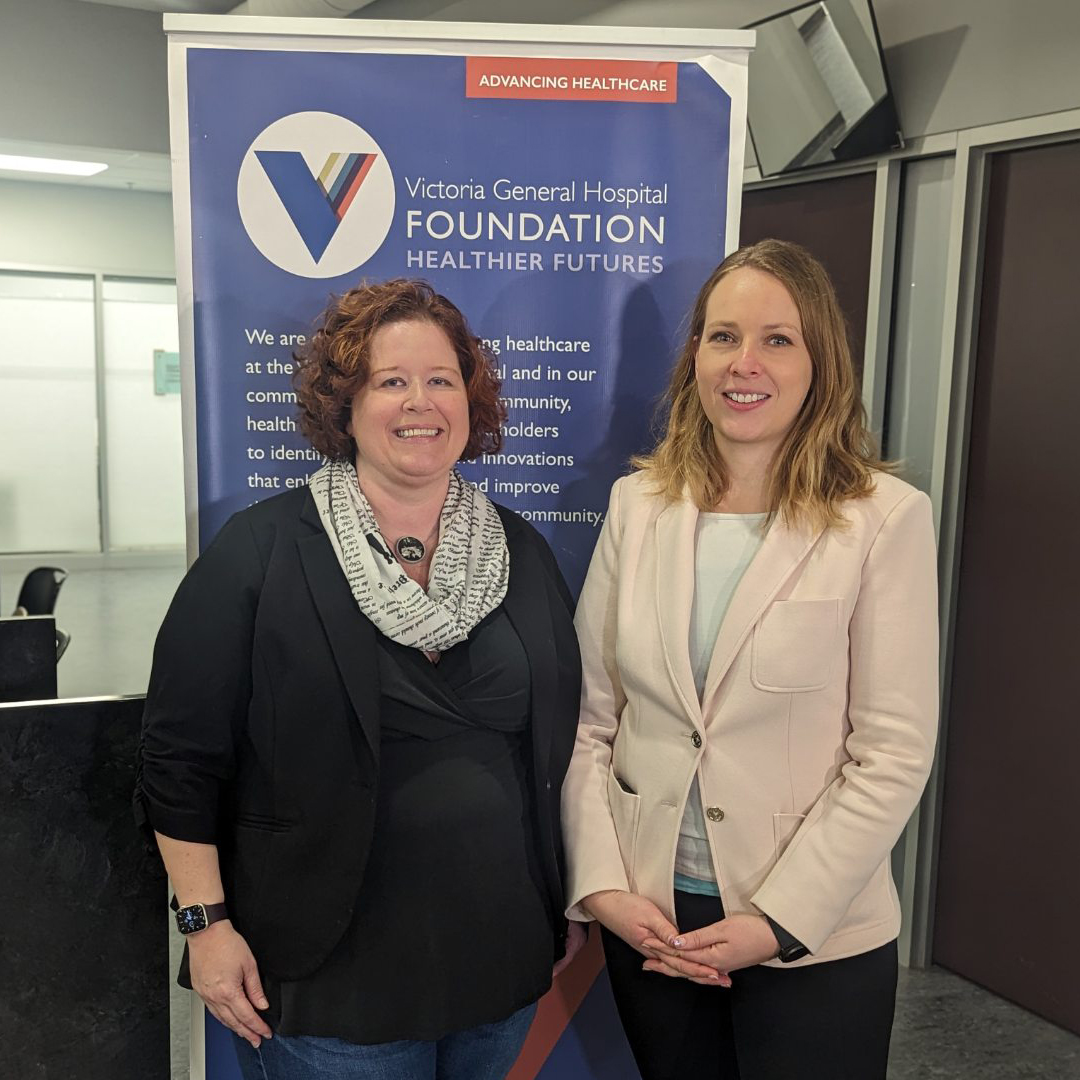Community members at Siloam Mission in Winnipeg now have access to new computers and technology aids thanks to a $20,500 grant from Victoria Hospital Foundation’s Community Leveraging Technology For Innovation (CLTI) grant program. Our investment in this new technology was made possible through the generous support of our community.
This technology is breaking down barriers for community members by providing computer and internet access in the Progressive Services Area to assist with job seeking, communicating with family, and accessing supports at other agencies in addition to enhancing programming in the Indigenous Art Therapy and Spiritual Care programs.
Building Connections Through Technology
The Progressive Services Area at Siloam Mission was created with the intent to provide accessible support and connection to services. While the space and the infrastructure has been in place for a few years, it was evident to the team that upgraded computer workstations were needed to serve the community as best they could.“This new technology gives us the ability to have more workstations that are higher functioning and better for those who come to us for support here,” says Tessa Blaikie Whitecloud, Chief Executive Officer at Siloam Mission. “It’s really important for people to have access to the internet and a good computer. Wherever we can at Siloam, we’re trying to empower community members to do this work for themselves. But without the right tools, that’s difficult. This investment made those tools possible, so that people can build independence in a healthy and self-sufficient way in a supportive environment with the right tech.”
Prior to the upgrades, the Progressive Services Area provided computer opportunities for 20 individuals per day, not including the frequent maintenance downtime required for the aging computers. The outdated computers were a source of frustration for community members, which often resulted in exasperated displays of anger that were upsetting and potentially triggering for others. The updated area can now serve 10 more individuals per day, for a total of 2,600 more computer opportunities every year.
The primary use for the new computers is personal communication, such as staying in touch with family and friends. Whitecloud explains that these new computers play a vital role in helping to reduce isolation and give people a place to go to find support.
“Access to social media sites and email is really important for people to be able to connect with family and friends,” says Whitecloud. “Lots of folks who are beginning their recovery journey might also be in different step programs and want to reach out and make amends with folks. When someone has access to a computer and internet, it's the most convenient and accessible way for them to communicate with other people regularly because they might not have a phone, or if they do have a phone, making sure that that's plugged in when you're staying in shelter can be difficult. We become people's permanent mailing address and have these internet sources for people to access that gives them a constant way of connecting with folks.”
Whitecloud emphasizes that internet access is fundamental to obtaining employment and housing. These computers can be used by community members to find new opportunities, which in turn empower individuals to rely less on Siloam which helps them to serve more people. These new workstations are also used to book medical appointments. Community members may use the computers to access services such as Manitoba’s Family Doctor Finder, schedule appointments with healthcare professionals, and print paperwork for medical exams.
“It’s often easier to do something via email or phone,” says Whitecloud. “If you don’t have reliable access to either of those things, it’s a real challenge. This technology really supports people to meet the requirements that they have to get their health needs met.”
The computers are also playing a key role in supporting mental health.
“It gives people a break, so they can take that time that they get slotted to themselves to just do whatever they want do on the computer or to feel like they're achieving things in the direction of moving out of homelessness,” says Whitecloud.
The computers are also used by individuals who are not experiencing homelessness but who may not have a computer in a space of their own, such as those who reside in a rooming house or where it may not be feasible to pay rent and have a computer with internet access. According to a Statistics Canada report, six percent of Canadians did not have access to the internet at home in 2020, with 26 per cent of those without access citing the cost of internet service as the reason and 13 per cent citing the cost of equipment.
Whitecloud says the reaction to the new computers has been overwhelmingly positive.
“People are excited that there’s less of a wait to use computers, that there’s more computers, and that they load faster,” says Whitecloud. “The computers are often all in use for as long as they’re available, and people look forward to being able to use them. We’ve also held different classes and workshops on those computers.”
This new investment in technology has also helped to create employment opportunities through Siloam Mission’s employment program, with two tech-savvy individuals experiencing homelessness being hired to staff the Progressive Services Area in the mornings to assist community members.New Technology Highlights
- Six new desktop computers, mouses, wireless keyboards, and monitors.
- One desktop computer for community members to receive assistance on an individualized basis.
- Three laptops for staff, Elders, and volunteers to work one-on-one with community members in a private space.
Creating Community And Enhancing Safety For Marginalized Individuals
The CLTI grant funded the addition of a television and an iPad for use in Siloam Mission’s Indigenous Art Therapy and Spiritual Care programs.
The Spiritual Care program is a space where individuals can connect with their beliefs and share their personal experiences. The program is led by a spiritual care team with daily support from Elders and knowledge keepers from different nations. On any given day, an estimated 20 people access the space on a come-and-go basis.
“It's an opportunity for us to connect and just hold conversations with them, because their journey matters, even if they happen to fall on rough times,” says Christine Vanagas, Director of Indigenous Relations and Healing. “We give space for discussion and sometimes the discussions are difficult. It gives people a chance to explore questions they have in a safe space and gives them time to share what's happening in their life and really connect spiritually in whichever way they feel they need to connect.”
The technology also supports community members in building networks, which in turn supports their resiliency and safety.
“It's important, especially with the community that we are serving, to have a strong social network, especially for women who we know are very vulnerable not only to violence but to sexual exploitation,” says Vanagas. “It's really important to have those connections and by offering different programs and opportunities for discussion and dialogue we’re building healthy relationships amongst the community.”
According to Statistics Canada, homicide rates for Indigenous women were close to six times higher than the rates for non-Indigenous women from 2001-2015. The Final Report Of The National Inquiry Into Missing And Murdered Indigenous Women And Girls emphasizes the importance of relationships in ending violence in the lives of Indigenous girls, women, and 2SLGBTQQIA people.
“They already are in many ways a family, but when we bring them into those spaces, we're really helping to strengthen those networks to build healthy boundaries and that reinforces their own personal safety,” says Vanagas. “They might not realize it and we don't want to do it in a way that imposes it, but by designing programs in such a way that we're able to now do, we are helping to build discussions. Those things are important because it just reinforces their personal safety. They know that there's other people who are looking out for them and that there is a safe space in the community and in connections with one another.”
Accessible Programming Breaks Down Barriers
Our investment in new technology has been instrumental in helping the team reimagine programming to make it more accessible to community members.
“We have neurodivergent learners, we have people with literacy barriers, we have other people who may be experiencing difficulties with their vision,” says Vanagas. “This technology has opened up so much more with what we can do, what we can engage, and since we've done that, there's been a couple of days where it's been standing room only in the devotions room because of the new things that we can offer to the community.”

The new equipment allows for the use of subtitles, adjustments to volume and lighting for those who are sensitive to stimulation, and gives the team a wider array of tools to create programming that extends beyond books. In the Indigenous Art Therapy program, the iPad allows patients to connect with Indigenous teachings as they explore art techniques and to have the ability to digitally create and preserve their art.
For Vanagas, the impact of accessible programming cannot be overstated.
“We're able to introduce different programs in different ways that people can learn,” says Vanagas. “Not everybody is going to learn from a text, so sometimes it's different learning. Watching a dramatization or watching somebody speak or present for a short period of time allows individuals to engage in the discussions in different ways. We've also been able to play music, which allows people to reflect. People can listen and enjoy and sometimes they'll perk up and get excited. People respond in different ways, we're all different. This just allows us to take different approaches in the way that we provide the spiritual care. There's so much technology in that little machine that we've been amazed at how it's expanded and opened up our programs.”
Vangas says Spiritual Care staff have said the technology has made their work easier and more pleasant, which in turn supports their personal wellness. Community members are enjoying the new programming, so much so that there is interest in expanding the weekday program to a full seven days per week.
“Community members say it's great, they're loving that people can watch different content and they've said to me they want more time, they want to be here every day,” says Vangas. “They are definitely reaping the benefits because they're coming more. They're staying longer for conversations and they're getting excited about some of the things that we're able to present and the different ways that we're able to present topics with them. It’s the hip place to be and a secret that I would tell other people is to get some sort of equipment like that that really helps you to engage people in different ways. It seems to be working here.”
A Healthier Community, A Stronger Healthcare System
Whitecloud recognizes that community health investments like Victoria Hospital Foundation’s CLTI grant have a positive impact that reaches far beyond the walls of Siloam Mission.
“I think it improves access to healthcare for people experiencing homelessness or people that are living in a housing condition where having access to internet is not possible, which obviously benefits them,” says Whitecloud. “It also reduces overall healthcare costs when these folks have access to quality and preventative care. Because we have a health clinic on site, we're often doing those referrals and those connection points, and giving people the autonomy to do that follow up by e-mail or take that appointment virtually. On site here at Siloam, it really means that people can have their healthcare issues addressed sooner and that hopefully then reduces costs for the whole system later.”
Whitecloud acknowledges that donors like those who support Victoria Hospital Foundation are instrumental in the work of Siloam Mission.
“Without support from community, including a Foundation like yourselves, we wouldn't exist and we know that we're serving so many people who need the ability to access support, healing, and recovery and to experience positive change in their own life. And that's only possible because of the community support.”
Through the generosity of our community, we have invested over $250,000 in CLTI grants to support seven local non-profits in improving their digital capacity in order to provide our community with better access to care and supports.



